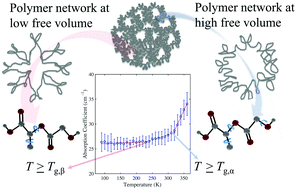Shmool, Talia A., and J. Axel Zeitler. "Insights into the structural dynamics of poly lactic-co-glycolic acid at terahertz frequencies." Polymer Chemistry (2019).
The mechanical properties of an amorphous copolymer are directly related to the dynamic processes occurring at the molecular level. Poly lactic-co-glycolic acid (PLGA) is a biodegradable copolymer, and in this work we investigate the dynamics of PLGA and its glass transition behaviour by performing variable temperature terahertz time-domain spectroscopy (THz-TDS) experiments. We correlate PLGA dynamics, as measured at terahertz frequencies, their temperature dependence, molecular weight (MW), lactide toglycolide ratio, and free volume. The THz-TDS data can be used to detect two distinct transition processes, Tβand Tg,α. To complement our analysis, we use dynamic mechanical analysis (DMA) to probe the β- and α-relaxation processes in PLGA, and compare the results obtained from the DMA experiments with those obtained using THz-TDS. The values of Tg,α, as determined from the THz-TDS experiments, are in good agreement with Tg,DSC, determined by calorimetric measurements, and with Tg,DMA, determined by the DMA measurements. We attribute Tβ to the change in dipole moments associated with the β-relaxation process, originating from the local rotation of C–O macromolecular chain segments, and Tg,α to the change in dipole moments due to large segmental motion of the copolymer backbone associated with the α-relaxation process. By showing experimental temperature-dependent results from THz-TDS and DMA for PLGA, we demonstrate that the behaviour of PLGA is in line with the potential energy surface interpretation by Goldstein as well as the free volume theory of Fox and Flory, and that both concepts together can be used to understand amorphous polymers.
for full paper see
… 0.50 mm in thickness. 1.2 Experimental setup. The THz-TDS
spectra were acquired using a commercial TeraPulse 4000 instrument across the spectral range of 0.2–2.2 THz (TeraView, Cambridge, UK). The sample temperature …


No comments:
Post a Comment